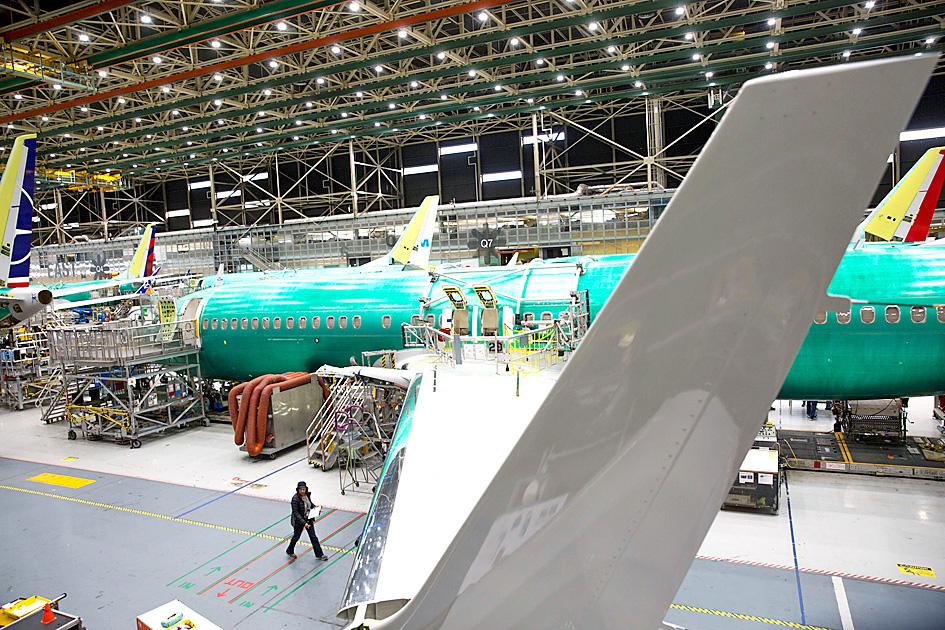Boeing Co has resumed production of the 737 MAX at a “low” rate, the company said on Wednesday, following two deadly crashes that led to the aircraft’s global grounding by regulators.
The jet has not flown commercially since March last year and is still a number of key steps away from being cleared for service by the US Federal Aviation Administration and other regulators.
Boeing said that work on the 737 MAX had resumed at the company’s factory in Renton, Washington, as it implements initiatives to enhance workplace safety and product quality.

Photo: AFP
“We’ve been on a continuous journey to evolve our production system and make it even stronger,” said Walt Odisho, Boeing vice president and general manager of the 737 program.
The aerospace giant in January shut down production amid uncertainty over when regulators would clear the jet to fly again.
Even before the effects of the COVID-19 pandemic, the MAX crisis had cost Boeing billions of US dollars in compensation for airlines and production expenses, including the cost to store more than 400 airplanes that could not be delivered to customers.
Since then Boeing’s troubles have deepened, as its airline customers have been thrust into a fight for survival due to plunging travel demand from coronavirus shutdowns.
Earlier on Wednesday, Boeing released details of a downsizing plan to cut total head count by 10 percent, or about 16,000 employees.
The company said that it approved the voluntary layoffs of 5,520 employees in the US and was notifying another 6,770 staff that they would be involuntarily let go.
“The COVID-19 pandemic’s devastating impact on the airline industry means a deep cut in the number of commercial jets and services our customers will need over the next few years, which in turn means fewer jobs on our lines and in our offices,” Boeing CEO David Calhoun said on Wednesday in a memo to employees.
The company faces the challenges of keeping employees safe, and working with suppliers and airlines “to assure the traveling public that it can fly safe from infection,” he said.
Boeing would have to adjust its business plans constantly, because the pandemic makes it hard to predict the effects on the company’s business, he added.
Additional reporting by AP

TECH BOOST: New TSMC wafer fabs in Arizona are to dramatically improve US advanced chip production, a report by market research firm TrendForce said With Taiwan Semiconductor Manufacturing Co (TSMC, 台積電) pouring large funds into Arizona, the US is expected to see an improvement in its status to become the second-largest maker of advanced semiconductors in 2027, Taipei-based market researcher TrendForce Corp (集邦科技) said in a report last week. TrendForce estimates the US would account for a 21 percent share in the global advanced integrated circuit (IC) production market by 2027, sharply up from the current 9 percent, as TSMC is investing US$65 billion to build three wafer fabs in Arizona, the report said. TrendForce defined the advanced chipmaking processes as the 7-nanometer process or more

OPEN SCIENCE: International collaboration on math and science will persevere even if the incoming Trump administration imposes strict controls, Nvidia’s CEO said Nvidia Corp CEO Jensen Huang (黃仁勳) said on Saturday that global cooperation in technology would continue even if the incoming US administration imposes stricter export controls on advanced computing products. US president-elect Donald Trump, in his first term in office, imposed restrictions on the sale of US technology to China citing national security — a policy continued under US President Joe Biden. The curbs forced Nvidia, the world’s leading maker of chips used for artificial intelligence (AI) applications, to change its product lineup in China. The US chipmaking giant last week reported record-high quarterly revenue on the back of strong AI chip

Qualcomm Inc’s interest in pursuing an acquisition of Intel Corp has cooled, people familiar with the matter said, upending what would have likely been one of the largest technology deals of all time. The complexities associated with acquiring all of Intel has made a deal less attractive to Qualcomm, said some of the people, asking not to be identified discussing confidential matters. It is always possible Qualcomm looks at pieces of Intel instead or rekindles its interest later, they added. Representatives for Qualcomm and Intel declined to comment. Qualcomm made a preliminary approach to Intel on a possible takeover, Bloomberg News and other media

LIMITED MEASURES: The proposed restrictions on Chinese chip exports are weaker than previously considered, following lobbying by major US firms, sources said US President Joe Biden’s administration is weighing additional curbs on sales of semiconductor equipment and artificial intelligence (AI) memory chips to China that would escalate the US crackdown on Beijing’s tech ambitions, but stop short of some stricter measures previously considered, said sources familiar with the matter. The restrictions could be unveiled as soon as next week, said the sources, who emphasized that the timing and contours of the rules have changed several times, and that nothing is final until they are published. The measures follow months of deliberations by US officials, negotiations with allies in Japan and the Netherlands, and